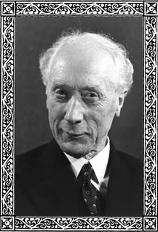 F M Alexander 1869 - 1955
F M Alexander 1869 - 1955
“Mr Alexander has done a service to the subject by insistently treating each act as involving the whole integrated individual, the whole psychophysical man. To take a step is an affair, not of this or that limb solely, but of the total neuromuscular activity of the moment, not least of the head and neck,”
Sir Charles Sherrington, Neurophysiologist, Nobel Prize for Medicine
Frederick Matthias Alexander (1869-1955) was an Australian actor and recitor who developed the educational process that is today called the Alexander Technique – a form of education that is applied to recognize and overcome reactive habitual patterns in movement and thinking.
Increasing hoarseness and intermittent loss of voice marred the early years of his acting career. Not helped by the medical profession, he used self observation and reasoning to solve his voice and breathing problem.
During years of experimentation he discovered the means to prevent what he described as problems in the way he ’used’ himself: he realised that the functioning of the voice depended on the correct balance of his entire neuromuscular system. Soon he started to work with others who sought his help, and developed a flourishing practice.
In 1904 Alexander came to London, where his reputation grew rapidly.
He worked with many well known people, including Sir Henry Irving, George Bernard Shaw, Aldous Huxley and numerous physicians, who recognised the basic scientific principles of the technique. In 1931 he developed the first teacher training school in London where – apart from two years during war time spent teaching in America - he worked until his death in 1955.
“We already notice, with growing amazement, very striking improvements in such diverse things as high blood pressure, breathing, depth of sleep, overall cheerfulness and mental alertness, resilience against outside pressures, and in such a refined skill as playing a musical instrument.” Prof Nicholas Tinbergen, Nobel Prize winner for Medicine and Physiology